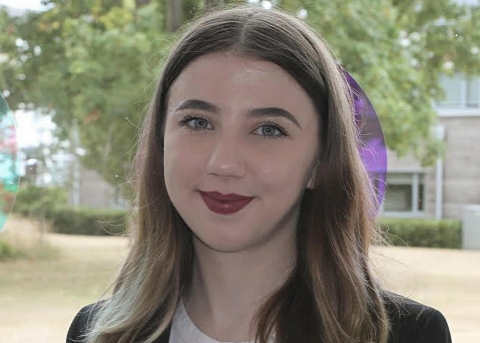

Jade Underwood discusses the impact of UPSU’s student submission for the TEF and their collaboration with the University of Portsmouth
7 minute read
Student partnership is now at the forefront of the new Teaching Excellence Framework (TEF), as the Office for Students (OfS) now considers both provider and student submissions in determining a TEF ranking for higher education institutions.
Recently, OfS proposed that Students’ Unions (SUs) should nominate a TEF student contact who would be responsible for coordinating the student submission on behalf of students. The University of Portsmouth Students’ Union (UPSU) submitted its student submission to OfS, alongside the University’s submission, in autumn 2022. The University of Portsmouth is currently awaiting a TEF ranking based on those submissions.
Student partnership is now at the forefront of the new Teaching Excellence Framework, as the Office for Students now considers both provider and student submissions in determining a TEF ranking for higher education institutions
Jade Underwood, Learning Experience Officer UPSU
UPSU chose to maintain its independence from the University’s own submission, but we worked collaboratively with the institution. We were able to provide each other with useful data on the student experience to further contextualise and authenticate each submission. We are proud of how our SU and university have worked collaboratively on this important process, something that not all universities and SUs achieved in the process.
As the student lead for the TEF student submission, what first struck me about the process was our ability to address some of the “Features of Excellence” far more comprehensively than other institutions. For our SU, and I’m sure for many others, the “Features of Excellence” highlighted gaps in our knowledge of important aspects of the university experience and what this means for students. It has shown us the areas that we collectively need to invest more time and resources into understanding, particularly in relation to “student outcomes”.
As the student lead for the TEF student submission, what first struck me about the process was our ability to address some of the “Features of Excellence” far more comprehensively than other institutions
Jade Underwood, Learning Experience Officer
UPSU is now looking to revise its internal student feedback mechanisms, such as our annual survey, in order to incorporate new questions. This will allow us to better understand how our university is upholding the features of an excellent university experience – and why the outcomes are the way they are. It also further emphasises the need for SUs to regularly adapt as students, employers and government’s expectations of universities are ever changing.
In this way, the TEF student submission has refocused our SU’s understanding of what makes an excellent university experience for our students, allowing us to maximise and redistribute our time and resources. Here’s what we’ve learned:
Why SUs should focus on outcomes
Arguably, until this process came along, the view was that a significant majority of SUs’ time and resources are lent to the “student experience” as opposed to “student outcomes”. However, as the government and wider higher education sector is seen to be placing increasing importance on graduate outcomes, should SUs reconsider their approach? And don’t most students care deeply about whether they get to the second year, complete their course and go on to get a decent job or further study?
At Portsmouth, the University and UPSU have this concern in common, resulting in a major collaborative strategic project focused on student outcomes that has seen substantial financial and resource investment from both sides. Through this project, UPSU offers help to provide enhanced student opportunities with the aim of increasing positive student outcomes to courses highlighted by student feedback and metrics or self-selecting courses. This will be achieved through our recently-launched ‘Student Consultancy Service’, and we encourage academics to get in touch with us at UPSU to find out more.
This will be achieved through our recently-launched ‘Student Consultancy Service’, and we encourage academics to get in touch with us at UPSU to find out more
Jade Underwood, Learning Experience Officer UPSU
Some academics may feel more apprehensive about this approach, but many have requested support for co-creation. With the introduction of the TEF student submission, highlighting the importance of SU-university co-creation practices, we hope this will legitimise SUs working collaboratively with universities to achieve improved student outcomes, where traditionally this may not have been seen as a job for the SU.
Undoubtedly, the student submission has given power to the SU. It will legitimise SUs’ future propositions to universities that focus on enhancing the university experience in areas highlighted by student feedback and metrics. Already, I’m seeing an increased willingness from our university to collaborate to improve.
Co-creation - not duplication
Of course, the relationship between SUs and universities across the sector will vary, and this may or may not impact their experiences of working with university leadership and the approach they took to working on the TEF submissions.
As above, we adopted a collaborative approach as we felt it beneficial to provide each other with data that helps us further contextualise aspects of the student experience, therefore allowing us to create more authentic and comprehensive submissions. However, regardless of the chosen approach, the TEF student submission has provided SUs with the opportunity to work more closely with universities than ever before.
The TEF student submission has facilitated a space for co-creation between universities and SUs, and from our perspective we hope this will lead to more frequent and improved co-creation projects and practices in the future at both a senior and local faculty or school-level.
Through this collaboration, SUs are able to show providers the importance of co-creation in working towards the same goal, and how this can maximise positive student impact, dismissing any notions of ‘work duplication’ across the institution that may have been held before. Approaches and perspectives will vary across the sector, but one view that is shared and made abundantly clear by the TEF, is the need to demonstrate evidence of impact.
Through this collaboration, SUs are able to show providers the importance of co-creation in working towards the same goal, and how this can maximise positive student impact
Jade Underwood, Learning Experience Officer UPSU
By working with the University on the TEF submissions, we have identified the need to improve each other’s methods of “closing the feedback loop”, ensuring that we have robust means of data collection to better demonstrate evidence of impact for years to come.
Ultimately, this will prevent assumptions and generalisations, allowing both SUs and providers to continuously develop and better meet student needs. The increasing importance of closing the loop has resulted in an investment from our university into improving the SU’s course representative structure, which we hope will improve the quantity and quality of feedback.
Powering up
For us, the TEF student submission has redefined what makes an excellent university experience, encouraging improved methods of robust data collection, interpretation and analysis to demonstrate evidence of impact.
The TEF student submission has redefined what makes an excellent university experience
Jade Underwood, Learning Experience Officer UPSU
It has empowered many SUs, clarified their purpose, and refocused attention and resources to better serve student needs. Perhaps most importantly, it has connected universities and SUs through strengthening existing partnerships and establishing new ones, which we hope will lead to more frequent and improved future collaboration, to better meet student needs.
The TEF student submission has provided SUs and universities with the foundations to operate a “high challenge, high support” assertive relationship for years to come; a relationship focused on empowerment, high expectations, high achievement, co-operation, tolerance of mistakes, adopting new approaches and risk-taking.
Author: Jade Underwood is Learning Experience Officer at the University of Portsmouth Students’ Union. This article is adapted from Jade’s original contribution for Wonkhe published in April 2023.
More Education Matters blogs
Breaking down barriers and empowering students through Peer-Assisted Learning
Explore Ayoola's experience piloting a PAL programme as a student union officer, and how it can create a community of support.
30 March 2023
9 min read

A point for reflection
Discover how we're helping students develop the Hallmarks of a Portsmouth Graduate through a range of extracurricular activities.
13 April 2023
5 min read

Degree apprenticeships: life-changing experiences for apprentices and staff
Mike Punt reviews the University’s journey and success delivering degree apprenticeships
8 June 2023
5 minutes

